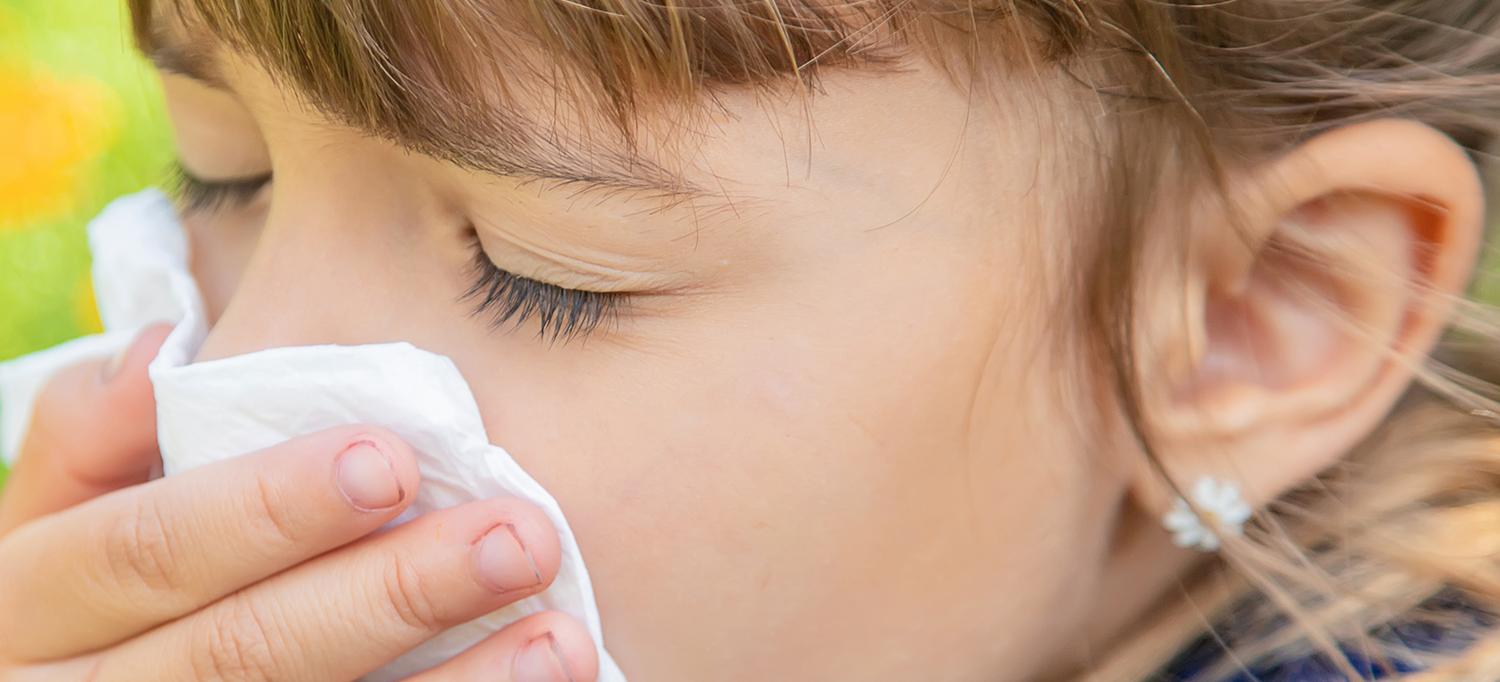
Photo: Yana Tatevosian / EyeEm/Getty
Allergies are common in children. About one in four experiences allergies, as well as their telltale signs: runny nose, itchy eyes, and hives. What’s less common is an understanding of what really causes allergies in kids, who is most likely to get them and at what age, and how best to treat them.
Anna H. Nowak-Wegrzyn, MD, PhD, and Kanwaljit Brar, MD, from the Pediatric Allergy Program, part of Hassenfeld Children’s Hospital at NYU Langone, help set the record straight—and reveal some surprising truths about kids and allergies.
Infants Don’t Get Seasonal Allergies
When tree, grass, or weed pollen hits peak levels, school-aged kids can get runny or stuffy noses. But if you see these symptoms in your baby or toddler, don’t assume outdoor allergens are to blame.
“These younger children may have nasal dryness from lack of humidity indoors, or they could have a viral infection, but it is unlikely that they have seasonal allergies,” says Dr. Brar. The reason is simple: “They don’t have enough exposure to pollen; multiple seasons of exposure are required for the immune system to develop allergies to pollen.” For that reason, seasonal allergies rarely occur until age 3 or 4 at the earliest.
“Sometimes allergies occur earlier in children who have severe eczema or asthma,” Dr. Brar says. Overall, though, the rate of seasonal allergy cases among kids in the first two years of life is very low.
Itchy Mouth? That Could Be a Sign of a Pollen Allergy
If foods like raw apples, peaches, melon, bananas, or carrots give your child an itchy mouth or throat, don’t immediately think they have a serious food allergy. Rather, their reaction could be a sign of a pollen allergy. Some fruits and vegetables have proteins that are very similar to tree, grass, and weed pollens. Kids who have seasonal allergies can react to the pollen-like proteins in these foods, a condition called pollen food allergy syndrome or oral allergy syndrome.
To make an appointment with one of our specialists, visit the Pediatric Allergy Program.
As Dr. Nowak-Wegrzyn, director of the Pediatric Allergy Program, notes, “Parents will say, ‘My kid used to eat these fruits or vegetables without any problem,’ but suddenly the child will tell them, ‘My mouth is itching me’ or ‘I have an itchy throat.’”
Like with other pollen allergies, reactions develop with increased exposure. So your child who loved bananas as a baby may find this fruit is causing an itchy mouth. The fruits and vegetables that trigger symptoms differ by season. Kids with springtime allergies may react to stone fruits, like cherries and plums, and vegetables, such as carrots, for example. “This is usually related to tree pollen, which is the most abundant type of pollen in New York City,” Dr. Nowak-Wegrzyn points out.
Does your child need to stop eating these foods entirely? Not necessarily. “The proteins that cause these cross reactions are incredibly unstable,” she adds, “so if the food is processed in some way—if it’s cooked, baked, pasteurized—the proteins get broken down and they don’t cause symptoms.” That means apple pie, apple juice, and, yes, cooked carrots are safe bets.
Severe Eczema and Food Allergy Risk Are Linked
Even before solid foods have passed their tiny lips, infants with severe eczema can test positive for food allergies. Eczema, also known as atopic dermatitis, is a chronic condition that can make your child’s skin itchy. “The more severe their eczema, the greater their risk of becoming allergic to peanuts, eggs, tree nuts, and other foods,” says Dr. Nowak-Wegrzyn. “This is because their skin is so inflamed that they become allergic through the skin.”
Peanut is a common allergen and can potentially lead to anaphylaxis, a life-threatening allergic reaction. National guidelines for the prevention of peanut allergy call for introducing peanut-containing foods to infants as early as 4 to 6 months of age, after starting other solid foods, to reduce the risk of a severe reaction down the road. “As soon as they have good head control and they’re ready to accept solid foods, that’s the time to introduce peanuts,” notes Dr. Nowak-Wegrzyn.
Allergists at the Pediatric Allergy Program make it a priority to see infants with severe eczema quickly. “In that first year of life, it’s a race against time because their risk of becoming allergic is increasing with every month,” she says. They can perform oral food challenges at Hassenfeld Children’s Hospital, during which your child is given gradually increasing amounts of the food under close supervision to observe and manage any reaction that may occur.
Allergies Run in the Family
If you have allergies, don’t be surprised if your child develops allergies too. Like eye color and other inherited traits, allergies appear to have a genetic component.
“Having a first-degree relative, either a parent or sibling with allergies, significantly increases the risk that the child will also develop an allergic condition,” says Dr. Nowak-Wegrzyn. When both parents have a history of allergic disease? The odds are even higher, studies show.
When evaluating a child’s allergic symptoms, doctors may ask about any family history of allergies or asthma. Blood and skin tests may also be used to identify a child’s triggers, whether that’s food, pollen, mold, dust mites, animal dander, or some other allergen.
Seasonal Allergy Medications Work Best When Started Early
Oral antihistamines and nasal steroid sprays work well to relieve seasonal allergy symptoms. But they work best when started early, before allergy season starts, and when they are given daily until pollen counts recede.
“Most parents want to use the least amount of medication possible, so they offer these treatments intermittently,” says Dr. Brar. “But in the long run, poorly controlled allergies could lead to headaches, sinusitis, or fluid in the ears. Children may also experience fatigue that interferes with school performance,” she says.
So start your child’s allergy medications early in the season, and give them regularly.
Kids as Young as 5 Can Benefit from Allergy Shots
Allergy shots, also known as subcutaneous immunotherapy, aren’t just for kids allergic to tree, grass, or weed pollen. They also work for triggers like mold, dust mite, and pet allergies.
When Dr. Brar’s own daughter started coughing and wheezing around dogs and cats, it took her by surprise. “I would give her an antihistamine, and her eyes would still get swollen. I knew when she was old enough that I wanted to do allergy shots.” Her daughter began the regimen at age 6 and continued well past her 9th birthday. Now she can take an antihistamine and she’s fine around pets.
“For someone with a pet allergy and ongoing pet exposure, allergy shots can help. They might not eliminate, but they can but significantly modify symptoms,” Dr. Brar says.

